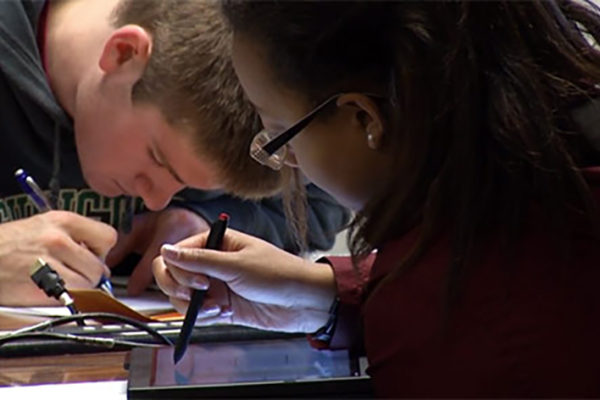The holidays come early for WUSTL scientists
A large wooden crate was delivered to the Compton Hall loading dock last week, direct from Paris. The crate contained a fabulous new instrument that WUSTL scientists say will transform their ability to approach problems in geology, biology, space science, engineering and materials science with new precision. Called the Cameca SIMS ims7f-geo, it is a state-of-the-art secondary ion mass spectrometer, one of only three in the world.
Active-Learning Classroom blends old and new to promote student learning
The Active-Learning Classroom (ALC) opened in fall 2012 on the lower level of Eads Hall as a pilot program. The classroom is a highly flexible space that facilitates collaborative group work as well as class discussions. The pilot program was such a success, it is hoped that additional active-learning classrooms will be designed throughout the Danforth Campus.
Trustees meet, discuss challenges, opportunities for School of Medicine
The Friday, Dec. 6, meeting of the Washington University in St. Louis Board of Trustees focused on the challenges and opportunities for the School of Medicine, according to Chancellor Mark S. Wrighton. The board also elected a new trustee, WUSTL alumnus Richard P. Mattione, PhD (pictured).
Breaking down stress: 10 foods that help bust stress
Nuts, avocados and even chocolate (in moderation) can help alleviate symptoms of stress.
Say Yes to Education adds Washington University as one of its 10 new partners
Washington University in St. Louis is among the 10 newest university partners in Say Yes to Education, the national nonprofit group that helps organize and galvanize entire cities around making higher education accessible and affordable for the children in their communities.
Synthetic RNAs designed to fight cancer
In search of better cancer treatments, Xiaowei Wang, PhD, and his colleagues at the School of Medicine have designed synthetic molecules that combine the advantages of two experimental RNA therapies.
University’s research key in new international guidelines for treatment of severe malnutrition
The World Health Organization has released new guidelines for the treatment of severe acute malnutrition, based in large part on research at the School of Medicine. Shown is the school’s Mark Manary, MD, whose research helped spur the changes.
Assessing chronic disease in the St. Louis region
Heart disease, cancer and diabetes are chronic diseases that account for $1.1 billion in hospital charges, affecting many individuals and families. The need to better understand these issues is examined in the fifth and final policy brief from the groundbreaking study “For the Sake of All: A Report on the Health and Well-Being of African Americans in St. Louis.”
Breaking down stress: Student volunteers on track to set free-backrub record this semester
Stressbuster volunteers provide free backrubs to students, faculty and staff. The next Stressbusters event is the Stress-Free Zone, 1-3 p.m. Sunday, Dec. 8, at Olin Library. Volunteer Delia Chassaing says massage helps reduce stress, muscle tension and anxiety.
Amazon drones: Technology almost there, insurance and regulation still far off
For Amazon’s recently announced drone delivery system
to get off the ground, the company will have to solve numerous
difficult technological challenges. Chief among them will be increasing
battery life, getting the drones to work without a central command and
to “think” on their own, and determining what kind of navigation sensors
they will use. As complicated as those tasks may be, says a WUSTL robotics expert, they will be much more easily solved than the
seemingly more simple issues of regulation and insurance.
View More Stories

